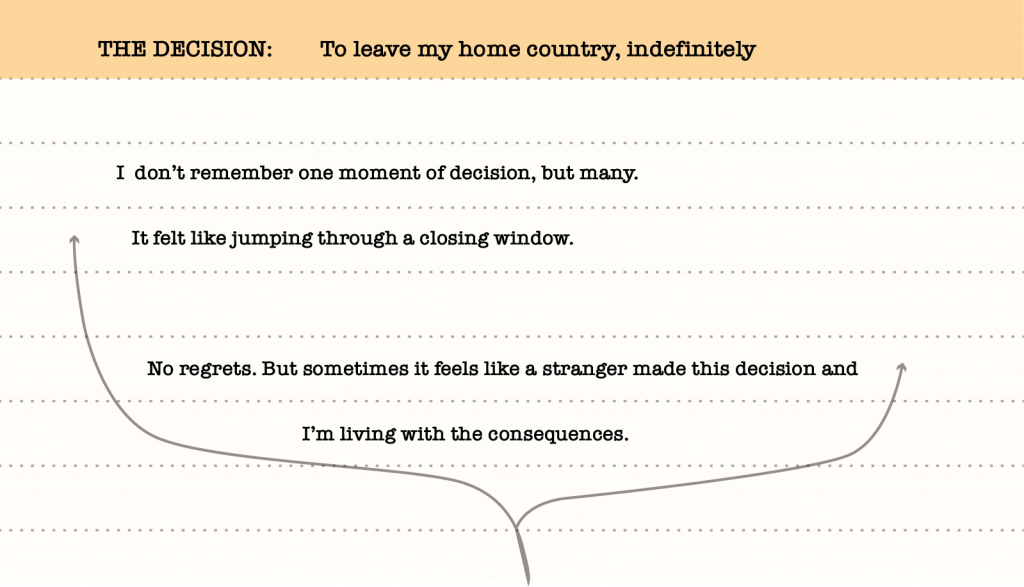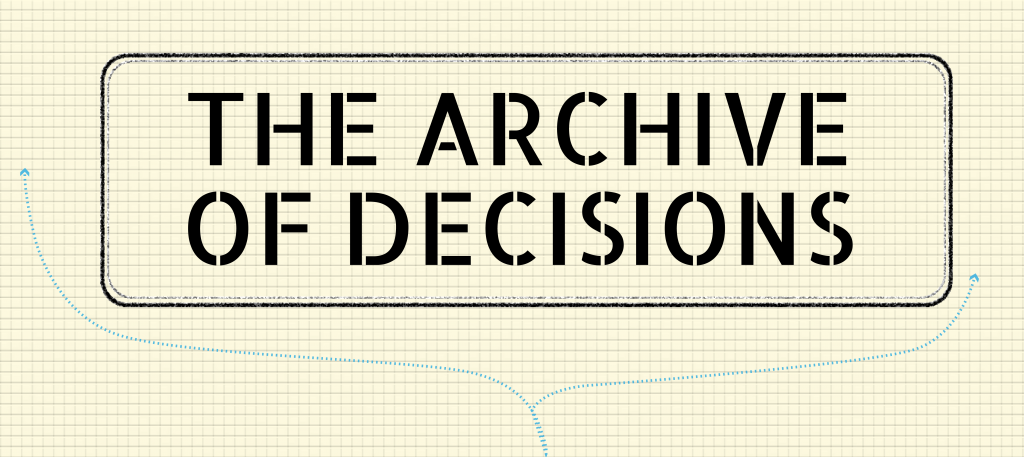I’ve been working on an initial idea for my unit 3 submission that I’m calling ‘The Archive of Decisions‘.
I’m excited by the idea but it has already gotten away from me a bit. It far excedes the scope of this unit, so I’m starting to wonder whether it could be my unit 6 or unit 7 project, and for this unit I present a conversation of me collecting a decision, documentation of various conversations and/or a converastion reflecting on the process – which is involving a lot of consideration around conversations and ethics. It’s also involving a lot of decisions – as any creative project does and how we make decisions within the creative process feels like a parallel topic.
But I have done a lot of thinking and work developing the idea, so I want to document it here.
The process so far
I started by reflecting on some of my own decisions and imagining how I would record these if I were to submit them to an archive. I played around with some physical and digital ‘index’ cards – this felt like the beginnings of an aesthetic and dramaturgical frame for the archive, but not one I’m sure I’d stick with.

I had some initial conversations with the people in my life, including my partner and family members, Marsha and artists I’ve worked with. The conversations were mostly discussing the shape of the project but I also invited people to reflect on decisions they’d made.
These conversations helped me think about how I might want to frame the project, including what question/invitation I’d put to people. For example, people would give very different responses to the following questions:
- What’s the last decision you made?
- What’s a big/significant decision you’ve made?
- What’s a decision you’re still thinking about?
The last question is what I’m currently leaning towards. I like that people could hear it as asking about a decision that is made or one that’s still in process.
I started thinking about what people need in order to feel comfortable participating. How much information do they need? How can I do this without steering their responses too much? I imagine people will want to know:
- What exactly is being asked of them
- How their material will be used – edited, shared in what format and context, how public will they be – anonymous/unidentifiable?
- Who am I/why I’m doing this?
This raises a slightly tricky question of how to talk about the project while it’s just theoretical – I don’t actually have plans to make a public archive. But I think I can just be honest with people about that. I can say that responses may be public one day, or I can go back and request permission at a later date.
A big question for me at the moment is how I would collect decisions from people and how they would exist in the archive. My plan, if I move forward, would be to try out a few different methods and see what they generate, to reflect on how they feel for me and the people I’m asking to contribute. Options I’m considering:
- Having a conversation with people and then I write a short summary in a unified style
- Having a recorded conversation with people – the audio and/or transcription is submitted to the archive (how curated would the conversations be? Set questions? Do I engage/converse?), perhaps with a short index card that summarises or categorises
- Asking people to fill in an index card with prompts – either remotely or in person (which could involve more of a conversation)
- Asking people to send me details of a decision in whatever format they like – handwritten letter, voicenote, text, which gets archived.
I’m also wondering what other information the archive should include in order to be meaningful to its audience – for example age, location of the decision-maker.
After thinking about all this, I drew up some prompt cards and invited the other students on MAIP, and some other contacts, to share a decision with me. I filmed a video of myself explaining the project and what I was asking for, as this allowed me to communicate in a more detailed and nuanced way and felt more human.
My instinct is that the archive will be richer and more interesting if people can submit in their own words. While if I were to have a conversation with each person, this would limit the number of archive entries I could collect. I like the idea of an expansive archive that collects both big and small decisions – a snapshot of what’s occupying our collective headspace. But I am also interested in having these conversations with people. The archive could potentially have material collected in different ways. I think it will be interesting to see how the collection method impacts the materials – will people be more candid/reflective in a conversation or if they’re writing in private; if we know each other of if I’m a stranger?
When I think about how this project might be experienced, I imagine a website that captures all of the ways these archived items cross and intersect, where you can delve into digital files, transcripts, audio in your own time. I can also imagine an exhibition-type presentation, with different media available – cases of handwritten index cards, projections of digital contributions, audio files, framed snippets of transcripts, maybe an invitation to add your item to the archive. I can also imagine myself writing something long form, perhaps something journalistic, that captures my own experience of being the person collecting all of these decisions – having these conversations and thinking through all of the issues raised when we look at our lives through the lens of decisions.
Ethical considerations that have arisen so far:
- The topic of decisions can touch on very personal and sensitive topics. How can I ensure people feel comfortable, considered and cared for when being asked to share these things? If it’s a conversation, how do I behave in order to achieve this? How can I make the sharing a positive experience?
- What information do people need in order to be able to fully consent to what I’m asking? How much safeguarding is appropriate? For example, what to do if someone shares more than they intended/feels comfortable with (allowing redactions in the archive?)? At what point do we accept that people are adults and responsible for their own actions? Relates to my interests in personal responsibility and experiences on similar projects. How much control do participants have in these circumstances? Conversations are a place that – personally – I don’t feel very in control, because of the speed required, it’s easy to say something you haven’t fully thought through.
- What are the ethics of having a long conversation with someone and distilling it down into a quote/soundbite – how would that feel – unhonoured/reduced? Or will people be glad to be less exposed?
- Are voice recordings ever really anonymous? How to ensure anonymity in a small trial project like this when I’m approaching people I know – who know each other.
- The ethics of selection. Is it OK if the archive only represents people I know, or people removed by a few degrees of separation from me. Is it less interesting as a result? Do I need to/should I try and make it representative of a broad spectrum of people?
- What are the ethics of editing or categorising what people tell me – making value judgements on their decisions?
- What are the ethics of writing for someone else – taking their words and putting them in my voice?
- What are the ethics of using people’s experiences for a project like this? Even though I’ve started this project from a position of wanting to understand myself better and I’m hopeful it will help others to understand themselves and other people better too, I am also using it for my MA, and potentially as a project that will bring me more opportunities, so there is self-interest there.
Something else I’ve been thinking about is how I’ve made decisions on the project so far. When I have an instinct to make a certain choice, where does that come from? I can trace my interests and my approach back to artists whose work I’ve been exposed to and appreciated. Also, as I’m discussing my ideas with artist-friends, they are giving me ideas – directly and indirectly. I’m arriving at decisions through conversation with them. What are the ethics of all this – of influence and appropriation, of collaboration and advice. How can I find ways to honour what others have given me?
New (and old) references that have come up through this process:
- No Such Thing – Quarantine – an invitation for a free meal in exchange for a conversation, curated through a series of pre-written questions.
- Wallflower Dances – Kate Daley & Sarah Hunter for Quarantine – this was an archive project where people’s personal memories of dancing were collected through an interview and photography; the artist interpreted the interview to produce a text written from the perspective of the participant.
- Leaves / Leaving – Lowri Evans – a project that invited strangers for a chat under a tree in a park about letting something go, the artist typed some of their words directly onto leaves fallen from the tree.
- Building of Spines – Kate Daley – a project based in a library where visitors are interviewed (through set questions related to the Dewy Decimal System) and their transcribed words are woven together into a combined text where individuals are anonymous, creating a portrait of people and place
- Before I Die – Candy Chang – a project placing chalkboards in public sites where members of the public can finish the sentence ‘Before I die…’
- PostSecret – Frank Warren – a project inviting people to send an anonymous postcard with a secret on it to the artist, which are published on a website
- Death and Birth In My Life – Matt Staubs – a video installation of two people having a conversation about death and birth
- If I had three lives – poem by Sarah Russell

The (Theoretical) Archive of Decisions
I’ve made some decisions recently that have changed the course of my life – but it’s not only the ‘big decisions’ that shape who we are.
I’m interested in how we make decisions in life and how we live with the decisions that we make. So, I’m experimenting with the idea of creating a collective archive of decisions to see what we can learn from one another.
What’s a decision that you’re still thinking about? Fill in this card, write me a letter, send me a voice note or let’s have a chat: +44 7501 617 642.
Decisions shared will be listened to respectfully and – one day – may be shared anonymously in a curated collective archive of decisions.


Leave a Reply